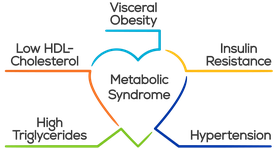Living on impulse (Part 4)
In early parts of this story, Maryanne made conscious choices that were unhealthy. She was a knowledgeable health care professional and yet she continued.

If you have ever said yes when you know you should be saying no, you have some appreciation for how primal urges can drive anyone to make choices in which comfort, convenience or pleasure trump knowledge. Though not as common in recent years, it was once quite common to see doctors and other medical professionals huddled outside a clinic or hospital smoking. “Don’t they know any better?”
Maryanne’s behavior was driven by physiological hunger; she had to eat. Two, she was at an emotional low—totally stressed out—which allowed emotion to trump reason. She chose to eat what was
available in the short term rather than make healthier choices with a long term focus.
Sugar-laced cookies fill an emotional need; they are comforting. Biting into one stirs good memories, perhaps of grandmother offering cookies and milk. Such memories are laced with love and
comfort.
Maybe you don’t respond to stress by gobbling a candy bar or a whole tub of ice cream. Your approach to self-comfort may instead be cookies, pastries, cigarettes, alcohol or drugs. You do not
consciously think that way in the moment. But subconsciously you are seeking a little respite from negative feelings; and such feelings are made worse by stress.
So, you give in for an instant; even when you KNOW negative consequences will follow. But there is comfort in the rationalization that the behavior is temporary. “I will do better tomorrow.”
There is always tomorrow.
It is a little lie, that everything is OK, that you are in control. Unfortunately, a temporary weakness too often morphs into a habit; with the habit eventually becoming a standard of behavior.
The lie grows.
In Maryanne’s case, the lie grew so big and pervasive that it overwhelmed her lifestyle. Her lifestyle lie was that she was somehow in control of a daily cycle of stress and poor choices. Her
knowledge was a false savior. Because she knew what better choices she should be making, she considered it only a matter of time until circumstances changed in a way that allowed her to make
those choices. Whereas she could see similar choices leading others down the road of obesity and metabolic illnesses, she was convinced that her knowledge would never allow that to happen to her.
Related Posts
"I'll do better tomorrow" turns bad choices into bad habits





